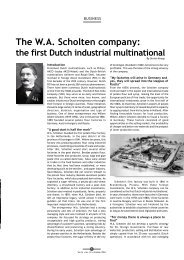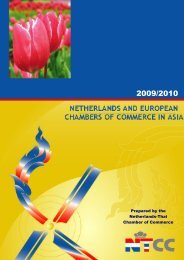November 2010 - Association of Dutch Businessmen
November 2010 - Association of Dutch Businessmen
November 2010 - Association of Dutch Businessmen
Create successful ePaper yourself
Turn your PDF publications into a flip-book with our unique Google optimized e-Paper software.
Extra<br />
MANDARIN FOR EXPATS<br />
IN SINGAPORE<br />
Text Michiel Sengers<br />
Expats in Singapore are increasingly enrolling in language<br />
schools to learn Mandarin. Some schools have seen a 30%<br />
increase in the number <strong>of</strong> students signing up last year.<br />
Mandarin is becoming an important language to know<br />
both for pr<strong>of</strong>essional and cultural reasons.<br />
First <strong>of</strong> all, the choice to learn Mandarin is a personal<br />
one. Whether you are a business man/woman, a student,<br />
housewife or lawyer, everybody could have their reasons<br />
to learn Mandarin to improve their lives in Singapore.<br />
You might want to be able to converse with a non-English<br />
speaking stallholder or taxi driver, or maybe you would like<br />
to show your respect by introducing yourself and asking<br />
about your counterpart at the start <strong>of</strong> a business meeting.<br />
Without any doubt, speaking Mandarin in a country where<br />
about three-quarters <strong>of</strong> the population are ethnic Chinese<br />
is always a wise choice!<br />
Do not be discouraged by those people saying that<br />
foreigners speaking Mandarin with a bit <strong>of</strong> an accent will<br />
always encounter problems uniting with the Chinese,<br />
regardless <strong>of</strong> their level or experience, because they are<br />
not native Chinese. Also, there are people saying that it is<br />
no use to learn and use Mandarin in Singapore, because a<br />
12<br />
lot <strong>of</strong> dialects are spoken. It’s a fact that Chinese dialects<br />
are still spoken, but this applies most to the elderly and<br />
the government is helping a major hand to get the Chinese<br />
Singaporeans to speak Mandarin. Different languages<br />
might be a better way to call it, because speakers <strong>of</strong> one<br />
dialect are unable to understand speakers <strong>of</strong> other dialects.<br />
Here are a couple <strong>of</strong> more reasons for expats to learn<br />
and converse in Mandarin:<br />
• Be part <strong>of</strong> society: now that you living abroad, adapting<br />
to your new environment will enrich your overseas<br />
experience. You will be able to understand more <strong>of</strong> the<br />
local traditions, celebrations, and so much more.<br />
• Indulge yourself in Chinese culture: learning Mandarin<br />
will make you understand much more about Chinese<br />
heritage and values. Many words have a historical<br />
background or represent cultural and ethical measures.<br />
You will get a better idea <strong>of</strong> how people think and<br />
where they are coming from.<br />
• Converse with the largest group worldwide: Mandarin is<br />
the most spoken language in the world with 800 million<br />
native speakers and 200 million as a second language.















